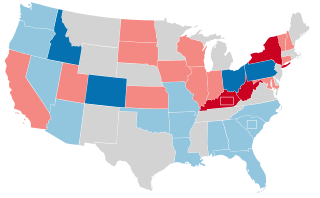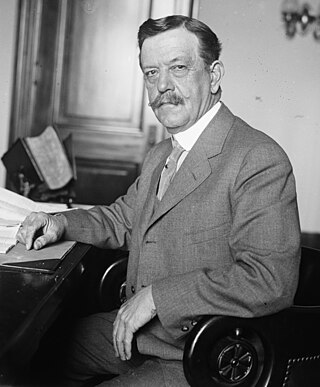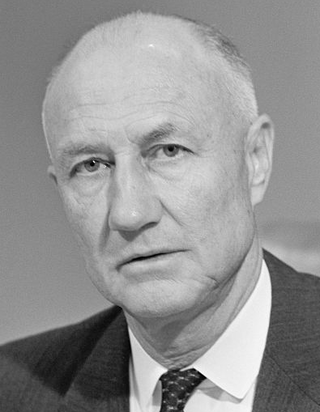
The Solid South or the Southern bloc was the electoral voting bloc of the states of the Southern United States for issues that were regarded as particularly important to the interests of Democrats in those states. The Southern bloc existed between the end of the Reconstruction era in 1877 and the passage of the Civil Rights Act of 1964. During this period, the Democratic Party overwhelmingly controlled southern state legislatures, and most local, state and federal officeholders in the South were Democrats. During the late 1800s and early 1900s, Southern Democrats disenfranchised blacks in all Southern states, along with a few non-Southern states doing the same as well. This resulted essentially in a one-party system, in which a candidate's victory in Democratic primary elections was tantamount to election to the office itself. White primaries were another means that the Democrats used to consolidate their political power, excluding blacks from voting in primaries.
Southern Democrats are affiliates of the U.S. Democratic Party who reside in the Southern United States.

The 1966 United States Senate elections were elections on November 8, 1966 for the United States Senate which occurred midway through the second term of President Lyndon B. Johnson. The 33 seats of Class 2 were contested in regular elections. Special elections were also held to fill vacancies. With divisions in the Democratic base over the Vietnam War, and with the traditional mid-term advantage of the party not holding the presidency, the Republicans took three Democratic seats, thereby breaking Democrats' 2/3rds supermajority. Despite Republican gains, the balance remained overwhelmingly in favor of the Democrats, who retained a 64–36 majority. Democrats were further reduced to 63-37, following the death of Robert F. Kennedy in June 1968.

The 1962 United States Senate elections was an election for the United States Senate. Held on November 6, the 34 seats of Class 3 were contested in regular elections. Special elections were also held to fill vacancies. They occurred in the middle of President John F. Kennedy's term. His Democratic Party made a net gain of four seats from the Republicans, increasing their control of the Senate to 68-32. However, this was reduced to 67-33 between the election and the next Congress, as on November 18, 1962, Democrat Dennis Chávez, who was not up for election that year, died. He was replaced on November 30, 1962, by Republican appointee Edwin L. Mechem. Additionally, Democrat Strom Thurmond became a Republican in 1964, further reducing Democrats to 66-34. This was the first time since 1932 that Democrats gained seats in this class of Senators.

The 1956 United States Senate elections were elections for the United States Senate that coincided with the re-election of President Dwight D. Eisenhower. The 32 seats of Class 3 were contested in regular elections, and three special elections were held to fill vacancies. Although Democrats gained two seats in regular elections, the Republicans gained two seats in special elections, leaving the party balance of the chamber unchanged.

The 1954 United States Senate elections was a midterm election in the first term of Dwight D. Eisenhower's presidency. The 32 Senate seats of Class 2 were contested in regular elections, and six special elections were held to fill vacancies. Eisenhower's Republican party lost a net of two seats to the Democratic opposition. This small change was just enough to give Democrats control of the chamber with the support of an Independent who agreed to caucus with them, he later officially joined the party in April 1955.

The 1938 United States Senate elections occurred in the middle of Franklin D. Roosevelt's second term. The 32 seats of Class 3 were contested in regular elections, and special elections were held to fill vacancies. The Republicans gained eight seats from the Democrats, though this occurred after multiple Democratic gains since the 1932 election, leading to the Democrats retaining a commanding lead over the Republicans with more than two-thirds of the legislative chamber.

Ellison DuRant “Cotton Ed” Smith was a Democratic Party politician from the U.S. state of South Carolina widely known for his virulently racist and segregationist views and his advocacy of white supremacy. He represented South Carolina in the United States Senate from 1909 until 1944.

Olin DeWitt Talmadge Johnston was an American politician from the US state of South Carolina. He served as the 98th governor of South Carolina, from 1935 to 1939 and again from 1943 to 1945. He represented the state in the United States Senate from 1945 until his death from pneumonia in Columbia, South Carolina in 1965. He has become infamously remembered for denying clemency to George Stinney, a 14 year-old African American boy who was wrongfully sentenced to death in 1944 after a trial that lasted for one single day, a conviction overturned 70 years later.
The 1936 Democratic National Convention was held in Philadelphia, Pennsylvania from June 23 to 27, 1936. The convention resulted in the nomination of President Franklin D. Roosevelt and Vice President John N. Garner for reelection.

The 1954 South Carolina United States Senate election was held on November 2, 1954 to select the next U.S. senator from the state of South Carolina. Senator Burnet R. Maybank did not face a primary challenge in the summer and was therefore renominated as the Democratic Party's nominee for the election in the fall. However, his death on September 1 left the Democratic Party without a nominee and the executive committee decided to nominate state Senator Edgar A. Brown as their candidate for the election. Many South Carolinians were outraged by the party's decision to forgo a primary election and former Governor Strom Thurmond entered the race as a write-in candidate. He easily won the election and became the first U.S. senator to be elected by a write-in vote in an election where other candidates had ballot access. A Senate election where the victor won by a write-in campaign would not happen again until 2010.

The 1966 South Carolina United States Senate special election was held on November 8, 1966 to select the U.S. Senator from the state of South Carolina. The election resulted from the death of Senator Olin D. Johnston in 1965. Then Governor Donald S. Russell entered in a prearranged agreement with Lieutenant Governor Robert Evander McNair in which Russell would resign his post so that he could be appointed Senator. However, former Governor Fritz Hollings won the Democratic primary election and went on to beat Republican state senator Marshall Parker in the general election to win his right to fill the remaining two years of the unexpired term.

The 1966 South Carolina United States Senate election was held on November 8, 1966 to select the U.S. Senator from the state of South Carolina simultaneously with the special election to fill out the remainder of Olin D. Johnston's term.

The 1956 South Carolina United States Senate election was held on November 6, 1956 to select the U.S. Senator from the state of South Carolina simultaneously with the special Senate election. Incumbent Democratic Senator Olin D. Johnston handily defeated Republican mayor of Clemson Leon P. Crawford.

The 1962 South Carolina United States Senate election was held on November 6, 1962 to select the U.S. Senator from the state of South Carolina. Incumbent Democratic Senator Olin D. Johnston defeated Governor Fritz Hollings in the Democratic primary and Republican W. D. Workman, Jr. in the general election.
The Progressive Democratic Party was a political party in South Carolina in the 1940s. It was founded in 1944 by John Henry McCray, editor of the black newspaper The Lighthouse and Informer to galvanize blacks to register and vote. While it did not achieve electoral success, it did successfully get blacks to play an increasingly important role in South Carolina politics.

The 1938 South Carolina United States Senate election was held on November 8, 1938, to select the U.S. Senator from the state of South Carolina. Incumbent Democratic Senator Ellison D. Smith defeated Governor Olin D. Johnston in the Democratic primary. The general election was contested, but a victory by Smith was never in doubt.

The 1914 United States Senate election in South Carolina was held on November 3, 1914 to select the U.S. Senator from the state of South Carolina. It was the first election in South Carolina in which the voters were able to choose the candidate in the general election. Incumbent Democratic Senator Ellison D. Smith won the Democratic primary and defeated nominal opposition in the general election to win another six-year term.

The 1932 United States Senate election in South Carolina was held on November 8.

The 1909 South Carolina United States Senate election was held on January 26, 1909. Its outcome was determined by a Democratic Party primary election held on August 25 and September 8, 1908. Interim Senator Frank B. Gary, who had been elected to complete the unfinished term of the late Senator Asbury Latimer, did not run for re-election. Democrat Ellison D. Smith won the Democratic primary and was elected by the General Assembly for a six-year term.














